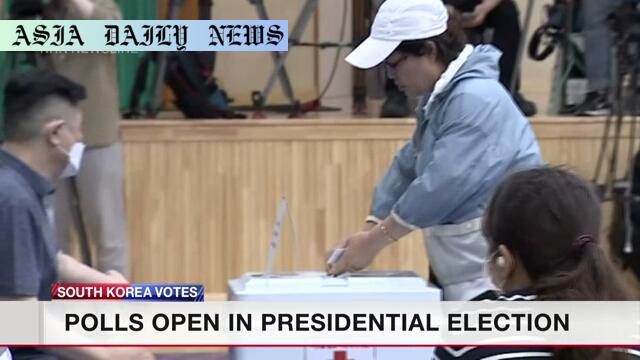South Korean election: Voters head to the polls amid debates over prior administration’s controversial leadership.

Historic South Korean Election in 2023
The South Korean presidential election of 2023 marks a pivotal moment for the nation as voters head to 14,000 polling stations to decide the future leadership. This election comes in the wake of a political shift, with the ousting of former president Yoon Suk-yeol due to his controversial declaration of martial law. The atmosphere across polling stations in central Seoul and beyond has been electric as citizens exercise their democratic right to choose between two starkly different candidates: Lee Jae-myung from the opposition Democratic Party and Kim Moon-soo from the conservative ruling People Power Party.
South Korean politics have always been heavily influenced by public perception of the sitting administration. The Yoon administration’s failures, particularly regarding martial law, have set a unique backdrop for this election. Voter turnout is expected to reflect the public’s stance on leadership styles, competence, and whether the country needs a complete change in governance direction or continuity with reforms.
The Candidates and Their Final Campaigns
Lee Jae-myung has campaigned vigorously on platforms of progressive change, promising a stronger welfare state, economic reforms, and more inclusive policies. His final campaign speech drew substantial crowds, indicating strong support from urban centers and liberal voters. In contrast, Kim Moon-soo of the People Power Party has emphasized restoring stability and traditional values while critiquing the policies of the Democratic Party as being too risky in a fragile global economy.
With both candidates presenting distinct visions for South Korea’s future, the stakes are high. Voters face a decision that could set the tone for the country’s political and socio-economic future. Political observers are closely watching to see how each candidate performs in key demographics, including young voters and those in rural areas who have felt overlooked in recent years.
Voting Process and Key Expectations
Polls opened at 6 a.m., and voters were seen queuing early to cast their ballots. The election day operations have been seamless so far, with no major irregularities reported. South Korea’s voting system, known for its efficiency and technology-driven processes, enables immediate counting after polls close at 8 p.m. The vote counting is expected to proceed swiftly, with initial results projected to emerge by late evening.
The election outcome depends on many factors, including how urban and rural regions vote, the impact of the Yoon administration’s controversies, and voter turnout, particularly among younger citizens. Time will tell which direction South Korea chooses, but this election has undoubtedly highlighted the nation’s commitment to a vibrant democratic process.
What’s at Stake for South Korea?
South Korea stands at a crossroads, with significant challenges to address and opportunities to seize. The next administration will inherit responsibilities ranging from maintaining strong global ties to addressing domestic issues like housing, youth unemployment, and economic inequalities. International audiences are closely monitoring this election, considering South Korea’s strategic role in Asian geopolitics and its status as a technology and innovation hub.
As citizens await the outcome, one thing is clear: this election symbolizes more than just a change in leadership—it reflects a collective desire for either continuity or transformation in a country that values its hard-earned democracy.
Commentary
Reflections on South Korea’s Pivotal Election
South Korea’s 2023 presidential election captures the essence of a vibrant democracy where the people’s voice undeniably shapes the nation’s future. This election feels especially important because it directly addresses the fallout of the Yoon administration’s controversial tenure. It’s a testament to the resilience of South Korean institutions that citizens are able to move beyond political tumult and peacefully exercise their democratic rights.
The Role of Leadership in South Korea’s Future
The race between Lee Jae-myung and Kim Moon-soo represents two stark paths for South Korea. On one hand, Lee offers a vision of progressive reforms and a push for greater inclusivity, which resonates with urban voters and the younger demographic. On the other hand, Kim provides a voice for those who value stability and traditionalism in uncertain times. It’s fascinating to see how these opposing visions reflect the country’s diverse electorate and the challenges South Korea faces in both domestic and international arenas.
Optimism for the Road Ahead
What makes this election particularly exciting is the level of engagement from the South Korean population. People are taking an active role in shaping the country’s direction at a critical juncture. Whichever candidate emerges victorious, the result will symbolize the people’s collective desires and aspirations.
While challenges like economic reform and social inequality await the winner, South Korea’s robust democratic system provides hope that the country is well-equipped to tackle these issues head-on. The outcome of this election is bound to echo far beyond the nation’s borders, reaffirming its role as a dynamic force on the global stage.


